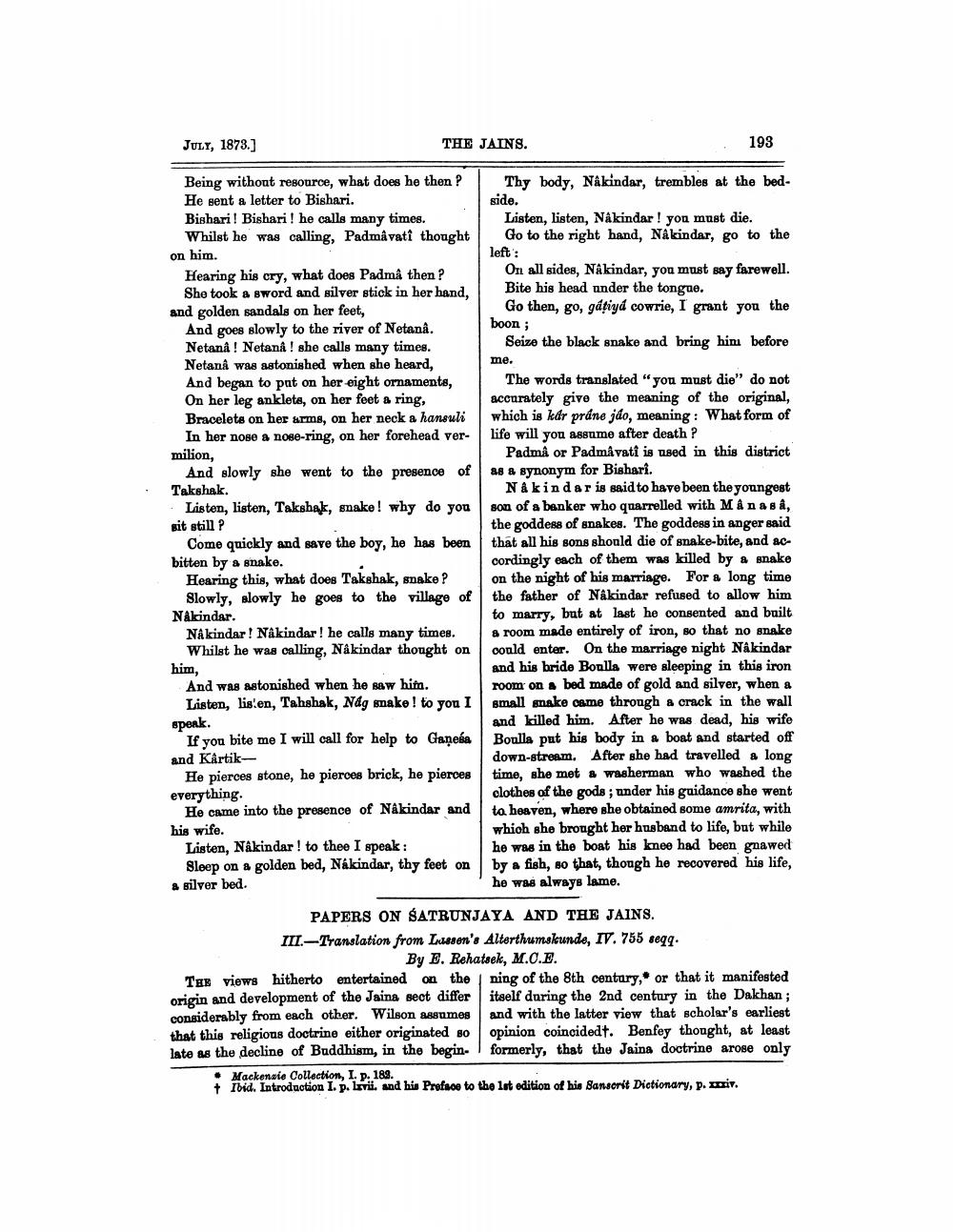________________
JULY, 1873.]
Being without resource, what does he then ? He sent a letter to Bishari.
THE JAINS.
Bishari! Bishari! he calls many times. Whilst he was calling, Padmavati thought on him.
Hearing his cry, what does Padmâ then? She took a sword and silver stick in her hand, and golden sandals on her feet,
And goes slowly to the river of Netanâ. Netanâ! Netanâ! she calls many times. Netanâ was astonished when she heard, And began to put on her eight ornaments, On her leg anklets, on her feet a ring, Bracelets on her arms, on her neck a hansuli In her nose a nose-ring, on her forehead vermilion,
And slowly she went to the presence of Takshak.
Listen, listen, Takshak, snake! why do you sit still ?
Come quickly and save the boy, he has been bitten by a snake.
Hearing this, what does Takshak, snake? Slowly, slowly he goes to the village of
Nåkindar.
Thy body, Nâkindar, trembles at the bed
side.
THE views hitherto entertained on the origin and development of the Jaina sect differ considerably from each other. Wilson assumes that this religious doctrine either originated so late as the decline of Buddhism, in the begin
Listen, listen, Nâkindar! you must die. Go to the right hand, Nakindar, go to the
left:
The words translated "you must die" do not accurately give the meaning of the original, which is kár práne jáo, meaning: What form of life will you assume after death?
Padma or Padmavati is used in this district as a synonym for Bishari.
Nakindar is said to have been the youngest son of a banker who quarrelled with Manasâ, the goddess of snakes. The goddess in anger said that all his sons should die of snake-bite, and accordingly each of them was killed by a snake on the night of his marriage. For a long time the father of Nâkindar refused to allow him to marry, but at last he consented and built a room made entirely of iron, so that no snake could enter. On the marriage night Nâkindar and his bride Boulla were sleeping in this iron room on a bed made of gold and silver, when a
Nakindar! Nâkindar! he calls many times. Whilst he was calling, Nâkindar thought on him,
And was astonished when he saw him.
If you bite me I will call for help to Ganesa and Kârtik
He pierces stone, he pierces brick, he pierces everything.
Listen, listen, Tahshak, Nág snake! to you I small snake came through a crack in the wall speak. and killed him. After he was dead, his wife Boulla put his body in a boat and started off down-stream. After she had travelled a long time, she met a washerman who washed the clothes of the gods; under his guidance she went to heaven, where she obtained some amrita, with which she brought her husband to life, but while he was in the boat his knee had been gnawed
He came into the presence of Nâkindar and his wife.
Listen, Nâkindar! to thee I speak:
Sleep on a golden bed, Nákindar, thy feet on by a fish, so that, though he recovered his life, a silver bed.
he was always lame.
193
On all sides, Nâkindar, you must say farewell. Bite his head under the tongue.
Go then, go, gatiya cowrie, I grant you the boon;
Seize the black snake and bring him before
me.
PAPERS ON SATRUNJAYA AND THE JAINS.
III-Translation from Lassen's Alterthumskunde, IV. 755 seqq. By E. Rehatsek, M.C.E.
ning of the 8th century, or that it manifested itself during the 2nd century in the Dakhan; and with the latter view that scholar's earliest opinion coincidedt. Benfey thought, at least formerly, that the Jaina doctrine arose only
Mackensie Collection, I. p. 188.
+ Ibid. Introduction I. p. lvii. and his Preface to the 1st edition of his Sanscrit Dictionary, p. xxxiv.




